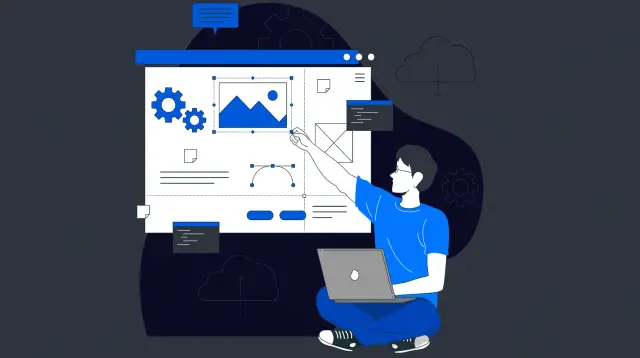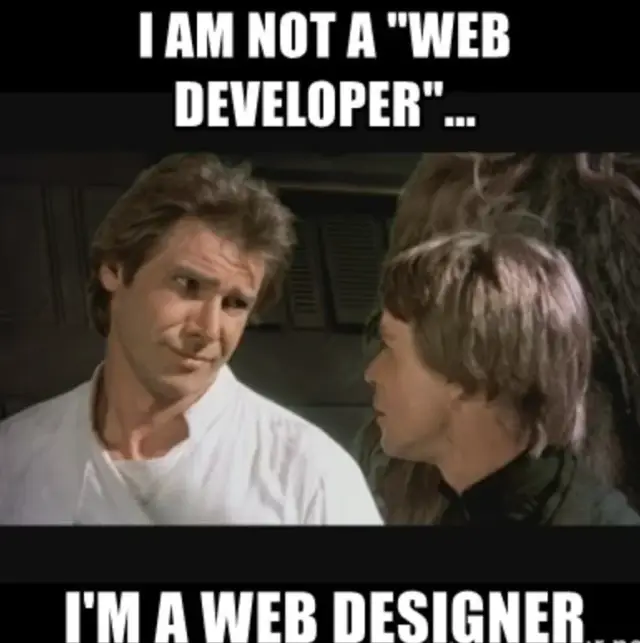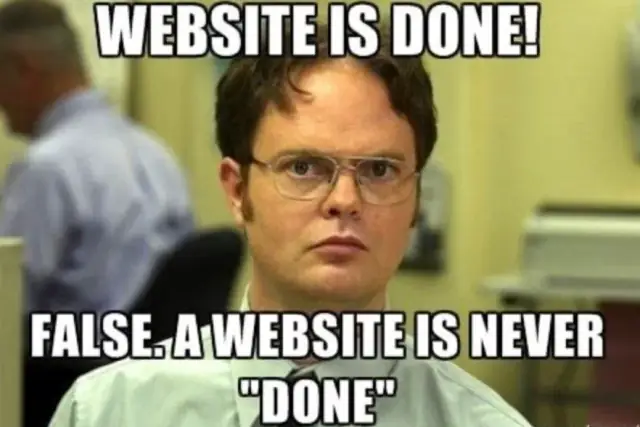Things You Should Know to Become a Highly Qualified Web Designer
Are you aspiring to become a web designer? Here’s everything you need to know!

Becoming a qualified web designer is a multi-step process that needs effort and hard work:
1. You need to learn the basics of designing and planning a site and how to follow best practices.
2. You need to get hands-on experience designing your own sites, not just following and building off of examples, but actually designing and building your own.
3. Once you have mastered the design process, it’s time to get a portfolio site to showcase your work.
However, designing and building a website from scratch requires seriousness. First, you need to learn the basics that will help you get a grasp of the marketing and design that goes behind having a successful website. Once you have experience, you can apply for job positions with a broader pay scale.
An ultimate guide on how to become a web designer
The process of making websites is called web design. It includes various elements, such as graphic design, content creation, and website design. Web design is theoretically a component of a larger field of web development, even though the phrases are frequently treated interchangeably.
To create the desired style, web designers employ a variety of software programs and resources, including Dreamweaver, Photoshop, and many more. To produce a successful layout, web designers must consider their target market, the site’s goal, and the design’s aesthetic value.
What qualifications do you need to be a website designer?
There is no one-size-fits-all answer to this question, as the qualifications needed to be a website designer can vary depending on the specific role and company. However, some general skills and capabilities are often required or desired by website designers.
A website designer’s essential skills include solid visual design skills, creativity, and an eye for detail. Website designers must be able to create visually appealing and user-friendly designs that meet their clients’ or employers’ needs and goals. They must also be able to think creatively to come up with unique and innovative design solutions. Additionally, website designers need to consider the audience’s requirements to create polished and user-friendly designs.
In addition to strong design skills, website designers must also understand web development technologies. Many website designers are also responsible for coding or developing their designs into working websites. So, a good knowledge of HTML, CSS, and other web development technologies is essential. Moreover, website designers should have good communication skills to effectively collaborate with clients or employers and convey their design vision. While there is no fixed answer to the question of what qualifications are needed to be a website designer, the skills and qualifications listed above are often preferred.
How do I start a career in web designing?
The best way to start a career in web designing may vary depending on your individual skills and experience. However, there are a few general tips that may help you get started in this field. Firstly, it is vital to have a good understanding of HTML, CSS, and other web development languages. Coding isn’t required in designing, but it’s still a skill that can improve your work. So, it might be helpful to learn the basics of HTML and CSS, etc.

Secondly, it can be good to create a portfolio of your work to showcase your skills to potential employers. No matter how adept a web designer you are, no one believes you if you don’t have evidence. Therefore, you need a portfolio of either your work for others or samples to market your skills. Without a portfolio, you won’t be able to find work. Most customers and companies are not very interested in your academic background. Many people won’t even be interested in how long you’ve been designing websites. They are more interested in your portfolio.
A web design portfolio is a digital file containing samples of your web design projects. Complete websites, previous projects, mockups, applications, styles, themes, images, and other materials may all be found in a web design portfolio. Get imaginative—this is supposed to be the enjoyable part of your web design journey! Since you are a genuine web designer, publishing your web design portfolio on your own site makes sense. To successfully display your samples, we advise keeping the concepts in your web design collection minimal.
Finally, networking with other professionals in the field can also be a great way to get your foot in the door of the web designing industry. Web designing may be an introvert’s paradise. It could seem to be a job where one spends most of their hours isolated, engrossed in computer, and without needing to interact with people. However, all this is far-fetched. Competent web designers must be good communicators to get along with their freelancing customers and their colleagues in a company’s marketing environment. Irrespective of your expertise, web design needs more than one person.
As a result, practicing your communication abilities is crucial. Do you get along well with prospective customers? Can you work effectively with several other experts, such as graphic artists and web developers? Can you follow instructions from your supervisor and effectively apply web design principles to those instructions? Always keep in mind that good communication may save or ruin a deal.
Can I teach myself to be a web designer?
It depends on your prior experience and skillset. However, if you are motivated and have a good understanding of basic web design principles, you can teach yourself to be a web designer. Many resources are available online and in libraries to help you learn web design basics. Once you understand the basics, you can start experimenting and developing your unique style. To become a professional web designer, you will need to invest time and effort into honing your skills. You can do this by taking courses, attending workshops, and reading design blogs and articles. However, the best way to learn is by doing, so create plenty of practice projects.
What’s the foundation of web design?
Learning the foundation of web design is vital before jumping to the world of designing. Websites that are both user-friendly and successful will adhere to user engagement, UX, standards, and patterns. UX is essentially a collection of standards that all users seek while using a site, including mobile compatibility, appealing colors, and simple design. UX is crucial because it determines a website’s bounce rate, which affects the whole idea’s success and market potential. So, when designing a website, it’s better to start by keeping in mind the UX.
However, there’s no fixed knowledge, and you’ll have to keep yourself updated as the UX evolves with the trends in web designing. And these trends develop and end quickly. What people want one year; they dislike in another. As you proceed with your site design endeavors, take that into account. Even after you get a career in web design, you’ll still be acquiring new skills in this area.
How long does it take to become a web designer?
It’s difficult to tell, as the amount of time it takes to become a web designer can vary depending on several factors. However, it is generally possible to become a web designer within a few months to a year if you have some prior experience with graphic design or coding. Acquiring the necessary skills may take a bit longer if you start from scratch. The best way to learn web design is through practice, so it is crucial to find a real-world experience to supplement your theoretical knowledge. There are many ways to do this, such as working on personal projects, participating in online forums and communities, or taking freelance work. With some dedication and effort, it is possible to become a proficient web designer quickly.
It depends on your previous education/knowledge.
If you’re tech-savvy, it’ll be easier for you. You might be aware of the essential basics. You can follow the basics to reach the advanced levels when you know the basics.
Whether you know some web designing and coding or not
You’re ahead of many if you already know some web design and coding. Technology is a field where you need to be ahead of others and learn new skills daily. It would help if you were adept at tools that can help you improve your web design.
Are you learning from scratch?
Learning from scratch means learning walking in the field of web design. So, it’s going to be difficult. First, you’ll need to know the basics and then start your actual journey. That’s why it’ll take time, but you’ll master the skills eventually.
Are you passionate about web designing?
Your passion for web design is everything. If you’re passionate about it, you’ll master it faster than you think. It’s a complex skill that can be simple if you’re passionate about it. When you like something, you can easily focus on it without getting distracted. Therefore, you’ll be able to learn it with ease.
Do you have the time to invest in learning web designing?
The beauty of skills is that you can learn them. But they need extensive hours to be mastered. Do you have those hours to invest? If yes, congratulations. Utilize those hours and become a pro at web designing.
- Are you willing to put in the effort?
- Can you create some samples?
- Do you have a portfolio?
- Are you able to communicate effectively?
- Can you work in a team?
- Are you active in online web design communities?
If your answer to the above questions is ‘Positive,’ you can become a web designer faster. Use your time, skills, and network wisely and become a professional web designer.
Is web designing a good career?
There is no doubt that web design is a promising career. It is a highly creative and challenging field that allows you to use your artistic and technical skills to create outstanding websites. There are millions of active websites, and they need constant updates. Every website needs a designer to make it good, beautiful and appealing to engage visitors. Millions of websites mean work for millions of web designers.

The demand for web designers is constantly growing as more and more businesses and organizations require professional-looking websites. This means that web design has a lot of job security, and you can usually find work even in difficult economic times. Moreover, web designers can efficiently work from home on several platforms. They can choose their place of work as long as they have their devices and internet. It’s job security and the freedom to work from anywhere you like.
Types Of Web Designers
Web designers may be classified as either freelancers, employees of agencies, or those working for an organization directly (in-house).
- Freelancers
Since they are effectively working for themselves, freelance web designers must manage and advertise their businesses while also finishing the design projects they are hired for.
It would be best if you thus weighed the flexibility to choose your own tasks against the amount of effort needed to manage your firm and attract customers. Sometimes, you’ll get high-paying clients from a platform, but you’ll be underpaid other times. Moreover, you’ll find clients occasionally. So, it’s a constant struggle to maintain a consistent income.
- Agency Employees
Operating for a firm provides stability and some financial predictability, but you’re no longer in control. The agency decides for you, your work, and your clients. Everything is independent of your mood and schedule.
Businesses may specialize in specific sectors or niches, impacting how much you enjoy being there. If you don’t like a particular niche, the employers aren’t going to reject that deal. So, you might end up hating your job.
- In-house Web Designers
In-house designing is like other 9 to 5 jobs. It differs from freelancers and agency employees in many ways. You may have to manage one website or a small section of a single website throughout your career. Moreover, you’ll have to show up daily during work hours and then leave for home in the evening.
One of the advantages of an In-house job is that you don’t have to struggle to get clients daily or weekly. You work in one place day in and day out and get a salary. In addition, you don’t have to communicate with clients and deal with them individually or directly. Instead, you may have a boss, and you only have to deal with that person. However, such a job can also become tedious. You work the same routine five days a week and don’t have any diversity in your work. It can also become an obstacle in reaching your full potential.
Additionally, like any career, web design has its downsides. The hours can be long, and the work can be very demanding. But if you are passionate about web design and willing to put in the hard work, it can be an enriching career.
Do I need a degree to be a web designer?
It’s a subjective question, as the educational requirements for becoming a web designer can vary depending on the type of position you are seeking. However, most employers will generally require at least a bachelor’s degree in graphic design, web design, or a related field. Additionally, having a solid portfolio of previous work is also critical for landing a job in this field. Therefore, while a degree is not always required to become a web designer, it can undoubtedly help your career search.
Instead of a degree, most employers require you to showcase your skills. So, building skills through a degree or self-learning is essential. They’re crucial in any career as pieces of paper are no more enough to land you jobs. Companies may ask for a presentation, previous works, or portfolio on any platform. In contrast, some might be interested in your degree too. To be on the safe side, acquire a degree and skills simultaneously. You may acquire new skills, improve your résumé, demand a higher rate, and demonstrate your expertise to prospective customers by earning certificates in specific fields. Web designers often get certifications from Adobe, Google, and General Assembly to improve their skills and gain credibility.
Is coding necessary for web design?
Coding is not strictly necessary for web design, but it can be extremely helpful in creating a website that looks and functions the way you want it to. With coding, you have more control over the details of your website and can create custom features that are impossible with other web design methods.
If you are not experienced in coding, many resources are available to help you learn, and many web design software platforms do not require coding knowledge. With coding, you can create custom designs and features that are not possible with other web design tools. Coding can also help you troubleshoot errors and problems with your website. It can give you more control over your website design, but it is not required. Ultimately, whether or not you choose to learn to code for web design is up to you, but it is something worth considering if you want to create a truly unique and custom website.
If you decide to create your own product, but coding is not your cup of tea, don’t worry. AppMaster will handle it for you. It’s a no-code development platform where you can create web and mobile applications. This platform develops apps without coding and provides you with the strongest no-code backend existing. Instead of hiring multiple developers to code and develop your app, AppMaster is the better alternative. Save time, effort, and money with AppMaster.





